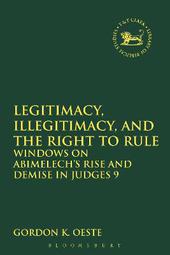
|
Legitimacy, Illegitimacy, and the Right to Rule: Windows on Abimelech's Rise and Demise in Judges 9
Paperback / softback
Main Details
| Title |
Legitimacy, Illegitimacy, and the Right to Rule: Windows on Abimelech's Rise and Demise in Judges 9
|
| Authors and Contributors |
By (author) Gordon K. Oeste
|
| Series | The Library of Hebrew Bible/Old Testament Studies |
|---|
| Physical Properties |
| Format:Paperback / softback | | Pages:288 |
|
| Category/Genre | Biblical studies |
|---|
| ISBN/Barcode |
9780567110626
|
| Classifications | Dewey:222.3206 |
|---|
| Audience | |
|---|
|
Publishing Details |
| Publisher |
Bloomsbury Publishing PLC
|
| Imprint |
T.& T.Clark Ltd
|
| Publication Date |
23 May 2013 |
| Publication Country |
United Kingdom
|
Description
This book explores the portrayal of the rise, reign, and demise of Abimelech in Judges 9 and asks about whose interests this portrayal may have served. The negative depiction of Abimelech's kingship in this chapter, coupled with Gideon's rejection of kingship in Judges 8:22-23, has led interpreters to view the passage as anti-monarchic. This perspective clashes with the pro-monarchic stance of Judges 17-21. However, while the portrayal of Abimelech's kingship is negative, it may yet have served as a legitimation strategy for the monarchy. In support, this study examines Judges 9 through three methodological lenses: a narrative analysis, a rhetorical analysis and a social scientific analysis. In addition, anthropological data on early and developing states shows that such states attempt to prevent fissioning (the tendency inherent within political systems to break up and form other similar units) by subverting local leaders, groups, and institutions, and so legitimate the centralization of power. When read in this light, Judges 9 supports monarchic interests by seeking to subvert localized rule and alliances in favor of a centralized polity.
Author Biography
Gordon Oeste is the Associate Professor of Old Testament and Hebrew at Heritage Theological Seminary, Cambridge, Ontario.
Reviews[The book's] strong attempt to weld three methodologies together is to be commended and copied. Its emphasis on attempts at delegitimization of Abimelech is welcome. Its search for an implied audience early in Israel's history joins the work of several of us in seeking a wholeness to Judges directed to the early monarchy. Showing how each method may point to this setting for the book is commendable...Welcome Gordon Oeste into the guild of Judges scholars by reading his book and providing helpful critique that will push the study of Judges further through use of every available methodology. * Review of Biblical Literature * ...a refreshing and valuable contribution to the study of the story of Abimelech. Indeed, the time may come when [Oeste]'s book will be counted among the seminal publications that paved the way toward recovering a measure of consistency in the political agenda of Judges. -- Serge Frolov, Southern Methodist University, USA * The Catholic Biblical Quarterly *
|